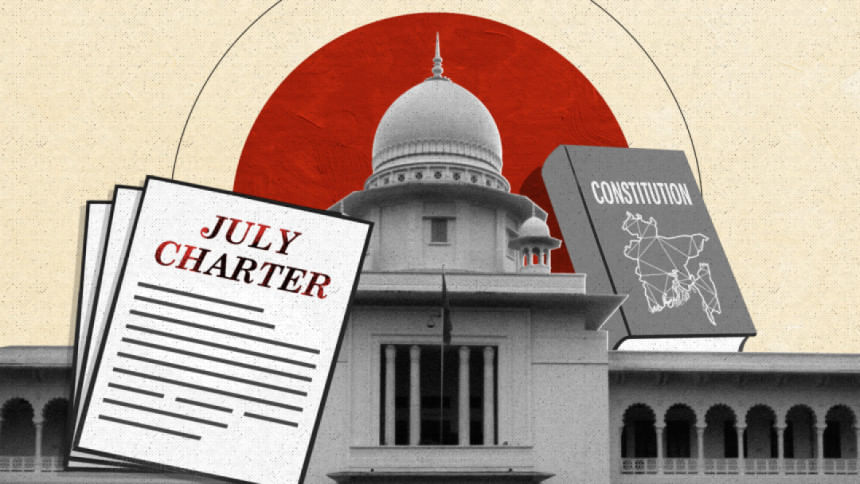July charter: Deadlock drags on, parties want govt to step in

Failing to resolve their differences over the proposed July charter within a one-week timeframe, major political parties yesterday urged the interim government to mediate talks.Officials said the government would wait a few more days for the parties to reach an understanding. If they fail, it will intervene and take a decision.Despite the deadline, parties like the BNP, Jamaat-e-Islami, and the National Citizen Party remained deeply entrenched in their positions.When contacted yesterday, BNP Sta...
Failing to resolve their differences over the proposed July charter within a one-week timeframe, major political parties yesterday urged the interim government to mediate talks.
Officials said the government would wait a few more days for the parties to reach an understanding. If they fail, it will intervene and take a decision.
Despite the deadline, parties like the BNP, Jamaat-e-Islami, and the National Citizen Party remained deeply entrenched in their positions.
When contacted yesterday, BNP Standing Committee Member Salahuddin Ahmed told The Daily Star, "If the government organises a meeting, I hope a way out of the crisis can be found. Since the National Consensus Commission and the government jointly created the problem, they must bear the responsibility."
Jamaat Assistant Secretary General Hamidur Rahman Azad said his party had taken an initiative for dialogue. "Those unwilling to participate cannot be forced. Dialogue is only possible when all parties come forward. It is now the government's responsibility to decide how to implement the reforms," he told this newspaper yesterday.
NCP Member-Secretary Akhter Hossen yesterday urged the government not to shift the burden of reforms onto political parties.
He was speaking at a discussion titled "July Charter: Implementation Pathline," organised by the National Lawyers Alliance at the Supreme Court Bar Auditorium in Dhaka.
Akhter called for immediate implementation of the reforms agreed upon during talks between political parties and the National Consensus Commission.
He said the ongoing political crisis must be resolved without delay to ensure citizens can participate in the upcoming election.
"If uncertainty around the reform process persists, it will also cast doubt on the government's exit strategy and the integrity of the electoral process," he warned.
Earlier, the BNP rejected Jamaat's call for dialogue, questioning why another political party, rather than the government, was making the invitation.
Meanwhile, nine parties including the NCP, Amar Bangladesh Party, Gono Odhikar Parishad, and six from the Ganatantra Mancha alliance have been holding talks to break the deadlock.
But, according to a Mancha leader, responses from other parties have not been encouraging.
Hasnat Quaiyum, coordinator of Ganatantra Mancha and president of Rastro Songskar Andolan, said they were still hopeful about finding common grounds.
Disagreements persist over the timing of a referendum on reforms outlined in the charter, the charter's implementation order, and the handling of dissent notes attached to some reform proposals.
Last Monday, the government urged parties to resolve these differences and reach a unified decision within a week.
Law Adviser Asif Nazrul told reporters after an advisory council meeting on that day, "We haven't issued any ultimatum. We'll wait. After that, the government will act as necessary."
The BNP ignored the deadline, saying the initiative did not originate from the government but from a section linked to Jamaat.
The party insists that Chief Adviser Prof Muhammad Yunus himself should convene a formal dialogue, and in that case, the BNP would participate.
BNP leaders maintain that the crisis was jointly created by the government and the consensus commission, which they claim favoured Jamaat.
"During the eight-month discussion, consensus was reached on key issues. How can all parties suddenly agree on something new within seven days? This is simply in favour of Jamaat," said a BNP standing committee member, seeking anonymity.
The BNP remains adamant that the referendum and the national election should be held on the same day as part of the process for implementing the July National Charter.
At a views-exchange meeting in Thakurgaon's Sadar upazila, BNP Secretary General Mirza Fakhrul Islam Alamgir said, "Some parties are saying that a referendum should be held before the election, but we are saying it should be held on the election day."
Turning to his audience, he added, "Do you understand what a referendum or charter means? These are things only a few educated, upper-class people who have come back from America understand, and they are trying to impose these on us."
Calling the ongoing crises "manufactured", he said, "We have accepted the reforms they want to introduce. We will implement those we agree on, and those we don't agree on will go to parliament."
Jamaat's Hamidur Rahman Azad reiterated his party's demands. "These are the people's demands -- implementation of the consensus commission's recommendations, holding a referendum before national polls, and issuing the necessary order for implementation. In fact, the government is killing time by not issuing the order."
He said the government must immediately issue the order and announce a referendum date. "The referendum must be held before the national election. Otherwise, the July uprising and all reform efforts will fail."
When The Daily Star contacted the Chief Adviser's Press Secretary Shafiqul Alam, he said the advisory council had suggested a timeframe of about a week but the parties could take more time if needed.
"Political parties have already taken some decisions during this transitional period. Hopefully, they will reach a consensus. If they fail, the advisory council will step in and make a decision as soon as possible, keeping in mind the best interests of both the parties and the people, especially with the national election expected in the first half of February," he said.
He added that ensuring a free, fair, and credible election remains the government's top priority.